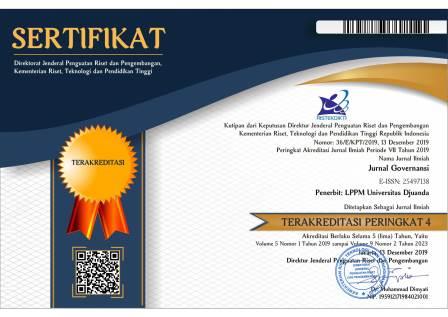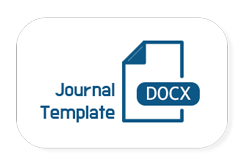IMPLEMENTASI KEBIJAKAN PENERIMAAN PESERTA DIDIK BARU BERDASARKAN SISTEM ZONASI DI KOTA BANDUNG
DOI:
https://doi.org/10.30997/jgs.v5i1.1699Abstract
The new student admission based on zoning system has been implemented in Indonesia since 2017 through the Ministerial Regulation of Education and Culture No. 17/2017, then renewed by the Ministerial Regulation of Education and Culture No. 18/2018. The regulation has been enacted for the Local Office of Education in all regencies/cities in Indonesia. To be implemented, every regency and city have enacted the operational regulations in accordance with each local conditions. The Local Government of Bandung City has implemented the zoning system since 2017, namely the Regulation of Mayor of Bandung No. 553/2017 and the Regulation of Mayor of Bandung No. 456/2018. The both regulations have the different rule of game, particularly the application of quota. The zoning quota of new student admission in 2017 was regulated only for 40-50 percent, but Bandung City in 2018 applied the zoning system for 100 percent. The aims of applying the zoning system were to closely bring the students to their residences, to reduce the costs of school transportation, and to eliminate the dichotomy between the favorite and unfavorite schools. The research uses the paired sample t-Test to compare the both Mayoral Regulations and to then find the dominant factor as the cause for occuring the conflict in the process of new student admission in Bandung City. Matland’s ambiguity-conflict model is used to explain the implementation of new student admission policy. Results of the research indicate that the dichotomy of favorite and unfavorite schools can not be removed, not just because of the public mindset, but also because of the unsupporting policy of local government, and the unreadiness of local government to provide the qualified infrastructures for the education in all schools.
Keywords: School Dichotomy, Policy Implementation, New Student Admission, Zoning System.References
Anderson, J. E. 1979. Public Policy Making: An Introductin. Boston: Houghton Miffin Company.
Baedhowi. 2009. Kebijakan Otonomi Daerah Bidang Pendidikan: Konsep Dasar dan Implementasi. Semarang: Pelita Insani.
Creswell, John W. 1994. Research Design: Qualitative & Quantitative Approaches. California: Sage Publication.
Dunn, William N. 1994. Public Policy Analysis: An Introduction, New Jersey: Prentice-Hall Inc.
Dwidjowijoto, Riant Nugroho. 2004. Kebi-jakan Publik, Formulasi, Implementasi, dan Evaluasi. Jakarta: Gramedia.
Grindle, Merilee. 1980. “Polities and Policy Implementation in the Third World. New Jersey: Princestown Univercity Press.
Indiahono, Dwiyanto. 2009. Kebijakan Publik Berbasis Dynamic Policy Analysis. Yogyakarta: Gava Media
Islamy, Irfan. 2002. Prinsip-Prinsip Peru-musan Kebijakan Negara. Jakarta: Bumi Aksara.
Jones, Charles O. 1984. An Introduction to the Study of Public Policy. Monterey-California: Brooks/Cole Publishing Company.
Lane, E. J. 1993. The Public Sector: Concepts, Models, and Approaches, London: Sage Publication.
Lilik Ekowati, Mas Roro. 2004. Perencanaan, Implementasi dan Evaluasi Kebijakan atau Program. Surakarta: Pustaka Cakra.
Mazmanian, D. A. & Paul. A. Sabatier. 1983. Implementation and Public Policy. London: Scott, Forestnan and Company.
Meter, Donald Van dan Carl Van Horn. 1975. “The Policy Implementation Process, A Conceptual Frame Work”. Administra-tion and Society 6, 1975. London: Sage Publication.
Nugroho. D. Riant. 2009. Kebijakan Publik Formulasi, Implementasi dan Evaluasi. Jakarta: PT. Elex Media Komputindo Kelompk Gramedia.
Pressman, Jeffrey L and Wildavsky Aaron. 1978. “Implementation”, dalam Shafritz, Jay M and Hyde, Albert C. Classic of Public Administration. Callifornia: Brooks/Cole Publishing Company.
Purwanto, E. Agus dan Sulistyastuti, D. Ratih. 2012. Implementasi Kebijakan Publik: Konsep dan Aplikasinya di Indonesia. Yogyakarta: Penerbit Gava Media
Sabatier, Paul A. 1993. “Top-Down and Bottom-Up Approaches to Implemen-tation Research”, dalam Hill Micheal. The Policy Process: A Reader. Halm 266-293. Hertfordshire. Haruester Wheatsheaf.
Supranto, J. 2004. Analisis Multivariat. Jakarta: Penerbit Rineka Cipta.
Wahab, Solichin Abdul. 2002. Analisis Kebijaksanaan dan Formulasi Imple-mentasi Kebijaksanaan Negara. Jakar-ta: Penerbit Bumi Aksara.
Wibawa, Samudra. Yuyun Purbokusumo. Agus Pramusinto. 1994. Evaluasi Kebi-jakan Publik. Jakarta: Raja Grafindo Persada.
Winarno, Budi. 2002. Prosedur dan Proses Kebijakan Publik. Yogyakarta: Media Pressindo.
Jurnal
Ardhi, Mohammad. 2015. “Evaluasi Manaje-men Penerimaan Peserta Didik Baru Sistem Real Time Online Dinas Pendi-dikan Kota Yogyakarta”.
Becker, Rosa. 2012. “International Student Recruitment:Policies and Developments in Selected Countries”.
Borchert, Michael. 2002. ”Career Choice Factors of High School Students”.
Dadson, Richard L. 2015. “An Analysis of The Relationship Between State Education Quality and Principal Preparation Practices”.
Fitz, John. 2015. ”Implementation Research and Education Policy: Practice and Prospects”.
Flannery, K. Brigid. 2016. “Implementation of SWPBIS in High School”.
Fumasoli, Tatiana. 2013. ”Organizational Studies in Higher Education: A Reflec-tion on Historical Theme and Prospec-tive Trends”.
Levy, Daniel C. 2013. “The Decline of Private Higher Education“.
Lin, Shufang, etc. 2016. “An Empirical Study of Institutional Research in A Senior High School”.
Locke, William. 2009. “Evidence Based Policy In Practice In National and Intrnational Contexts”.
Marbun. H. E. B. 2014. ”Kebijakan Peneri-maan Peserta Didik Untuk Golongan Keluarga Miskin (GAKIN) Di Sekolah Menengah Pertama Negeri 5 Balik-papan”.
Moja, Teboho. 2000. ”Nigeria Education Sector Analysis: An Aanlytical Syntesis of Performance and Main Issues”.
Mowen, Thomas J. 2014. ”Punishment in School: The Role of School Security Measures”.
Mulford, Bill. 2003. ”School Leaders: Challenging Rolesand Impact on Teacher and School Effectiveness”.
Matland. E. Richard. 1995. “Synthesizing the Implementation Literature: The Ambiguity-Conflict Model of Policy Implementation”, Journal of Public Administration Research and Theory: J-PART, Vol. 5, No. 2 (Apr.,1995), pp. 145-174.
Stavrou, Sophia. 2016. ”Pedagogising in University: On Higher Education Policy Implementation and its Effects on Social Relations “.
Sopianto Basofi. 2015. “Implementasi Kebi-jakan Penerimaan Peserta Didik Baru (PPDB) Online Tingkat Sekolah Mene-ngah Atas Di Kota Pekanbaru Tahun 2011-2013”.
Stephan, Sharon. 2014. ”School Mental Health: The Impact of State and Local Cpacity Building Training”.
Tansel, Aysit. 2013. ”Supplementary Edu-cation in Turkey: Recent Developments and Future Prospects”.
Kuo, Yu-Ying. 2012 “Taiwan’s Public Policy Education: US-Style”.
Wang, Zhenmin. 2007. “Key Factors That Influence Recruiting Young Chinese Student”.
Disertasi
Purwanti, Dian. 2019. Pengaruh Kebijakan Pemerintah terhadap Pelaksanaan Penerimaan Peserta Didik Baru, Perbandingan Pelaksanaan PPDB SMP Tahun 2017 dan 2018 di Bawah Peraturan Walikota Bandung Nomor 553 Tahun 2017 dan Nomor 456 Tahun 2018. Bandung: Pascasarjana FISIP Universitas Padjadjaran.
Peraturan
Peraturan Pemerintah Republik Indonesia Nomor 17 Tahun 2010 tentang Penge-lolaan Penyelenggaraan Pendidikan.
Peraturan Menteri Pendidikan dan Kebu-dayaan Republik Indonesia Nomor 17 Tahun 2017 tentang Penerimaan Peserta Didik Baru.
Peraturan Menteri Pendidikan dan Kebuda-yaan Republik Indonesia tentang Penerimaan Peserta Didik Baru Sistem Zonasi.
Peraturan Walikota Bandung Nomor 610 Tahun 2016 tentang Petunjuk Teknis Pelaksanaan Penerimaan Peserta Didik Baru Di Kota Bandung.
Peraturan Walikota Bandung Nomor 553 Tahun 2017 tentang Petunjuk Teknis Pelaksanaan Penerimaan Peserta Didik Baru di Kota Bandung.
Peraturan Walikota Bandung Nomor 456 Tahun 2018 tentang Petunjuk Teknis Pelaksanaan Penerimaan Peserta Didik Baru di Kota Bandung.
Downloads
Published
How to Cite
Issue
Section
License
Authors who publish with Jurnal Governansi agree to the following terms:
- Authors retain copyright and grant the journal right of first publication with the work simultaneously licensed under a Creative Commons Attribution 4.0 International License that allows others to share the work with an acknowledgement of the work's authorship and initial publication in Jurnal Governansi.
- Authors are able to enter into separate, additional contractual arrangements for the non-exclusive distribution of the journal's published version of the work (e.g., post it to an institutional repository or publish it in a book), with an acknowledgement of its initial publication in Jurnal Governansi.
- Authors are permitted and encouraged to post their work online (e.g., in institutional repositories or on their website) prior to and during the submission process, as it can lead to productive exchanges, as well as earlier and greater citation of published work.




















